View in other NatureServe Network Field Guides
NatureServe
Montana
Utah
Wyoming
Idaho
Wisconsin
British Columbia
South Carolina
Yukon
California
New York
Wavy Moonwort - Botrychium crenulatum
Other Names:
Botrychium dusenii
State Rank Reason (see State Rank above)
This moonwort species is known from numerous observations in western Montana. Most populations are located on either National Forest or State lands. Populations are generally small in size and occupy roadsides or other similarly open or disturbed habitats. As such, it is vulnerable to activities such as weed invasion, weed spraying and road maintenance.
- Details on Status Ranking and Review
Population Size
Score2 - Small: Generally 2,000-10,000 individuals.
CommentLikely over 2,000 plants in MT, though available population data are imprecise.
Range Extent
Score1 - Peripheral, Disjunct or Sporadic Distribution in MT: Widespread species that is peripheral, disjunct or sporadically distributed within MT such that it occurs in <5% of the state (<7,500 sq. miles or the combined area of Beaverhead and Ravalli Counties) or is restricted to 4-5 sub-basins.
Area of Occupancy
Score0 - High: Occurs in >25 Subwatersheds (6th Code HUC’s).
Environmental Specificity
Score1 - Moderate: Species is restricted to a specific habitat that is more widely distributed or to several restricted habitats and is typically dependent upon relatively unaltered, good-quality habitat (C Values of 5-7).
Trends
Score0-3 - Population trends are unknown.
Threats
Score1 - Medium: 11-30% of the populations are being negatively impacted or are likely to be impacted by one or more activities or agents, which are expected to result in decreased populations and/or habitat quality and/or quantity.
Intrinsic Vulnerability
Score1-2 - Moderate to High Vulnerability.
Raw Conservation Status Score
Score
6 to 10 total points scored out of a possible 19.
General Description
Wavy Moonwort is a small, perennial fern with a single aboveground frond. The frond is usually 10 cm or less tall, yellow-green, and divided into two segments which share a common stalk. The mostly sterile segment is once pinnatifid with usually three or four well separated pairs of thin textured, broadly fan-shaped pinnae which have distinct veins and crenulate margins. The fertile segment is longer than the sterile segment, is branched (often like a tiny Christmas tree), and bears grape-like sporangia. Spores germinate underground and develop into minute, subterranean, non-photosynthetic gametophytes which depend on an endophytic fungus for nourishment.
Phenology
Fronds mature in June-July.
Diagnostic Characteristics
Yellow-green color and well separated, thin textured, broadly fan-shaped pinnae with crenulate margins and prominent veins are diagnostic of B. crenulatum. It may be easily confused with B. ascendens, B. lunaria and B. minganense. Reliable field determination of moonworts depends on the careful use of technical keys and comparison with silhouette outlines of verified specimens. Identification can be complicated because there is often a high degree of morphological variability between individuals in a population and between populations of the same species; several species may grow together at the same site, and the few diagnostic characters may not be apparent in small plants.
Species Range
Montana Range
Range Descriptions
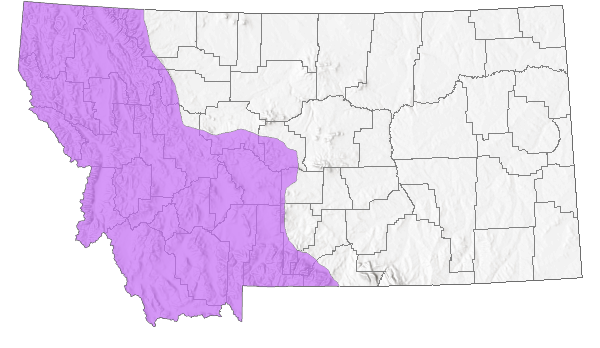
 Native
Native
Range Comments
BC, AB, MT and ID south to CA and AZ (Lesica et al. 2012. Manual of Montana Vascular Plants. BRIT Press. Fort Worth, TX and Farrar 2011).
Observations in Montana Natural Heritage Program Database
Number of Observations: 190
(Click on the following maps and charts to see full sized version)
Map Help and Descriptions
Relative Density
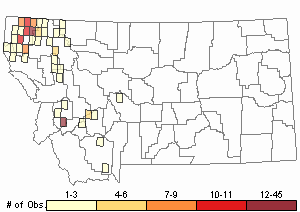
Recency
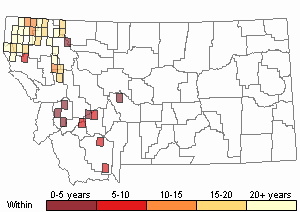

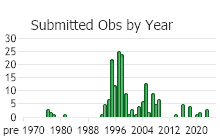
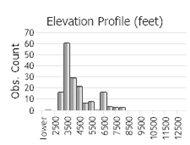 (Observations spanning multiple months or years are excluded from time charts)
(Observations spanning multiple months or years are excluded from time charts)
Habitat
Various mesic sites from low to moderate elevations, including roadsides and other disturbed habitats. Sites may be partially shaded or open.
National Vegetation Classification System Groups Associated with this Species
Forest and Woodland
Montane - Subalpine Forest and Woodland
Grassland
Montane - Subalpine Grassland
Wetland and Riparian
Riparian and Wetland Forest
Human Land Use
Transportation
Stewardship Responsibility
References
- Literature Cited AboveLegend:
 View Online Publication
View Online Publication Lesica, P., M.T. Lavin, and P.F. Stickney. 2012. Manual of Montana Vascular Plants. Fort Worth, TX: BRIT Press. viii + 771 p.
Lesica, P., M.T. Lavin, and P.F. Stickney. 2012. Manual of Montana Vascular Plants. Fort Worth, TX: BRIT Press. viii + 771 p.
- Additional ReferencesLegend:
 View Online Publication
View Online Publication
Do you know of a citation we're missing? Farrar, Donald. 2011. Moonwort (Botrychium) Systematics. Ada Hayden Herbarium. Iowa State University.
Farrar, Donald. 2011. Moonwort (Botrychium) Systematics. Ada Hayden Herbarium. Iowa State University. Ferriel, Roger D. 2001. A conservation strategy for the six sensitive species of Botrychium on the Kootenai National Forest. M.S. Thesis. University of Montana. Missoula, MT.
Ferriel, Roger D. 2001. A conservation strategy for the six sensitive species of Botrychium on the Kootenai National Forest. M.S. Thesis. University of Montana. Missoula, MT. Lesica, P. and K. Ahlenslager. 1989. Demographic monitoring of three species of Botrychium (Ophioglossaceae) in Waterton Lakes Park, Alberta. Unpublished 1989 progress report, 5 pp. plus appendices.
Lesica, P. and K. Ahlenslager. 1989. Demographic monitoring of three species of Botrychium (Ophioglossaceae) in Waterton Lakes Park, Alberta. Unpublished 1989 progress report, 5 pp. plus appendices. Lesica, P. and K. Ahlenslager. 1994. Demographic monitoring of three species of Botrychium (Ophioglossaceae) in Waterton Lakes Park, Alberta: 1993 progress report. Unpublished report to the U.S. Fish and Wildlife Service. Montana Natural Heritage Program, Helena, Montana. 19 pp.
Lesica, P. and K. Ahlenslager. 1994. Demographic monitoring of three species of Botrychium (Ophioglossaceae) in Waterton Lakes Park, Alberta: 1993 progress report. Unpublished report to the U.S. Fish and Wildlife Service. Montana Natural Heritage Program, Helena, Montana. 19 pp. Lesica, P., M.T. Lavin, and P.F. Stickney. 2022. Manual of Montana Vascular Plants, Second Edition. Fort Worth, TX: BRIT Press. viii + 779 p.
Lesica, P., M.T. Lavin, and P.F. Stickney. 2022. Manual of Montana Vascular Plants, Second Edition. Fort Worth, TX: BRIT Press. viii + 779 p. Mantas, M. and R.S. Wirt. 1995. Moonworts of western Montana (Botrychium subgenus Botrychium). Flathead National Forest. 103 pp.
Mantas, M. and R.S. Wirt. 1995. Moonworts of western Montana (Botrychium subgenus Botrychium). Flathead National Forest. 103 pp. Paris, C. A., F. S. Wagner and W. H. Wagner, Jr. 1989. Cryptic species, species delimitation, and taxonomic practice in the homosporus ferns. Amer. Fern J. 79:46-54.
Paris, C. A., F. S. Wagner and W. H. Wagner, Jr. 1989. Cryptic species, species delimitation, and taxonomic practice in the homosporus ferns. Amer. Fern J. 79:46-54. Vanderhorst, J.P. 1997. Conservation assessment of sensitive moonworts (Botrychium subgenus Botrychium) on the Kootenai National Forest. Unpublished report. Montana Natural Heritage Program, Helena, MT 82 pp. plus appendices.
Vanderhorst, J.P. 1997. Conservation assessment of sensitive moonworts (Botrychium subgenus Botrychium) on the Kootenai National Forest. Unpublished report. Montana Natural Heritage Program, Helena, MT 82 pp. plus appendices. Wagner, D.H. 1992. Guide to the species of Botrychium in Oregon, November 1992. Unpublished report. USDA Forest Service 19 pp., plus figures.
Wagner, D.H. 1992. Guide to the species of Botrychium in Oregon, November 1992. Unpublished report. USDA Forest Service 19 pp., plus figures. Wagner, Jr., W.H., F.S. Wagner, C. Haufler and J.K. Emerson. 1984. A new nothospecies of moonwort (Ophioglossaceae, Botrychium). Canadian Journal of Botany 62:629-634.
Wagner, Jr., W.H., F.S. Wagner, C. Haufler and J.K. Emerson. 1984. A new nothospecies of moonwort (Ophioglossaceae, Botrychium). Canadian Journal of Botany 62:629-634. Wagner, W. and F. Wagner. 1986. Three New Species of Moonworts (Botrychium Subgenus Botrychium) Endemic in Western North America. American Fern Journal 76 (2):3347
Wagner, W. and F. Wagner. 1986. Three New Species of Moonworts (Botrychium Subgenus Botrychium) Endemic in Western North America. American Fern Journal 76 (2):3347 Wagner, W. H. and F. S. Wagner. 1993. Ophioglossaceae. In: Flora of North America Editorial Committee, eds. 1993. Flora of North America North of Mexico. 3+ vols. New York and Oxford. Vol. 2, pp. 85-106.
Wagner, W. H. and F. S. Wagner. 1993. Ophioglossaceae. In: Flora of North America Editorial Committee, eds. 1993. Flora of North America North of Mexico. 3+ vols. New York and Oxford. Vol. 2, pp. 85-106. Wagner, W. H., Jr. and F. S. Wagner. 1990. Notes on the fan-leaflet group of moonworts in North America with descriptions of two new members. American Fern Journal 80:73-81.
Wagner, W. H., Jr. and F. S. Wagner. 1990. Notes on the fan-leaflet group of moonworts in North America with descriptions of two new members. American Fern Journal 80:73-81. Wagner, W.H., and E.S. Wagner. 1983. Genus communities as a systematic tool in the study of new world Botrychium (Ophioglossaceae). Taxon 32(1): 51-63.
Wagner, W.H., and E.S. Wagner. 1983. Genus communities as a systematic tool in the study of new world Botrychium (Ophioglossaceae). Taxon 32(1): 51-63. Wagner, W.H., and F.S Wagner. 1981. New Species of Moonworts, Botrychium Subgenus. Botrychium, From American Fern Journal 71:20-30.
Wagner, W.H., and F.S Wagner. 1981. New Species of Moonworts, Botrychium Subgenus. Botrychium, From American Fern Journal 71:20-30. Zika, P. F. 1994. A draft management plan for the moonworts Botrychium ascendens, B. crenulatum, B. paradoxum, and B. pedunculosum in the Wallowa-Whitman, Umatilla, and Ochoco National Forests. Unpublished report. Oregon Natural Heritage Program, Portland, OR. 41 pages plus figures, tables and appendices.
Zika, P. F. 1994. A draft management plan for the moonworts Botrychium ascendens, B. crenulatum, B. paradoxum, and B. pedunculosum in the Wallowa-Whitman, Umatilla, and Ochoco National Forests. Unpublished report. Oregon Natural Heritage Program, Portland, OR. 41 pages plus figures, tables and appendices.
- Web Search Engines for Articles on "Wavy Moonwort"





